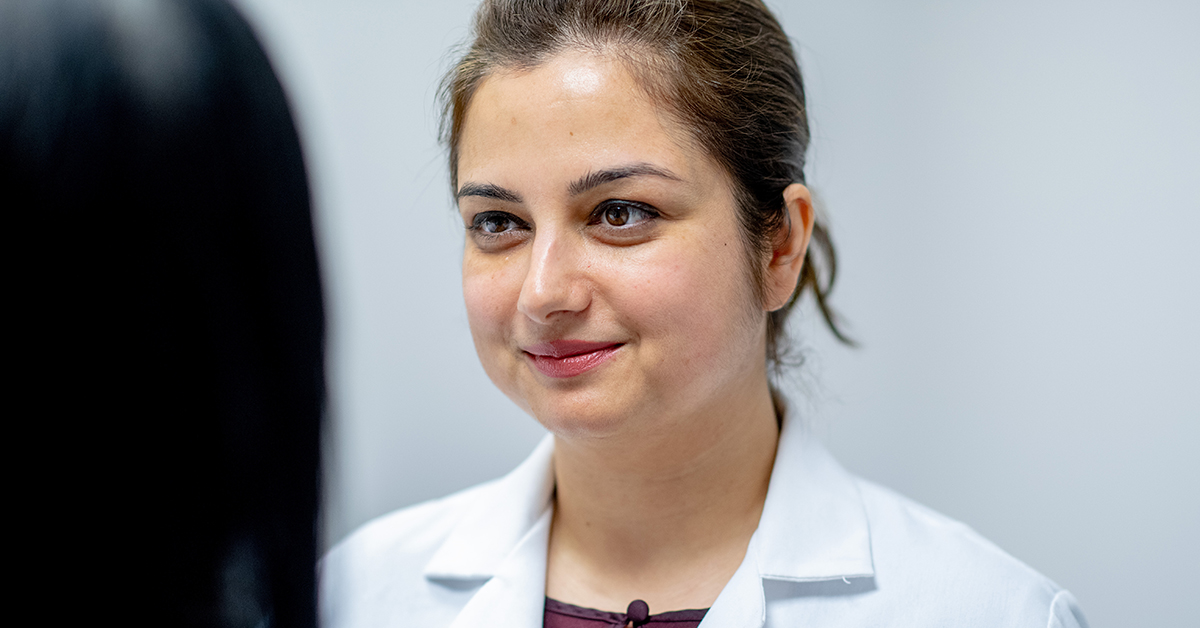
Everything You Need to Know About Lymphoma
-
Updated 2/16/2021
Updates were reviewed by Shazia K. Nakhoda, MD
While lymphoma is the most common type of blood cancer, there are many different subtypes that require nuanced treatment. Because of this, getting an accurate diagnosis and receiving individualized care can make a big difference in patient outcomes.
Understanding the basics of lymphoma may help you better understand your diagnosis and what is happening inside your body. Here are answers to some common questions about lymphoma:
Q. What is lymphoma?
A. Lymphoma is a cancer that starts in your lymphocytes. Lymphocytes are a type of white blood cell that is part of the body’s immune system.
Q. How does lymphoma spread?
A. Lymphocytes travel throughout the bloodstream and the lymphatic system to fight infection. The lymphatic system is a network of vessels, nodes, and ducts that passes through nearly all of the body’s organs and tissues. This makes it easier for lymphocytes that mutate and become cancerous to spread throughout the lymphatic tissue and to certain organs.
Q. What are the different types of lymphoma?
A. There are two main categories of lymphoma: Hodgkin lymphoma (previously called Hodgkin's disease) and non-Hodgkin lymphoma.
- Hodgkin lymphoma most often begins in the lymph nodes, which are small, bean-shaped organs found in the neck, underarm, groin, or inside the chest, abdomen, and pelvis. The body has hundreds of lymph nodes that filter out foreign particles and harmful cells that travel along with infection-fighting lymphocytes. When lymphoma cells are present in the body, they can gather and form masses in the lymph nodes.
This type of lymphoma is uncommon, accounting for only about 10 percent of all lymphoma cases. It is typically diagnosed early, is considered highly treatable, and is most commonly seen in young adults and those older than age 55. - Non-Hodgkin lymphoma (NHL), which tends to develop in older adults, accounts for about 90 percent of lymphoma diagnoses. The numerous types of non-Hodgkin lymphoma are often divided into indolent (slow moving, usually with few symptoms) and aggressive (growing quickly, often causing symptoms) categories. These two forms of NHL present different clinical behaviors and have different approaches to treatment.
Non-Hodgkin lymphoma is also grouped by type based on whether the lymphoma has started in B-cells or T-cells. Most begin in B-cells, which normally create antibodies that help prevent foreign substances from causing problems in the body.
Q. What are the symptoms of lymphoma?
A. The most common symptom of most types of lymphoma is swollen or enlarged lymph nodes in the neck, underarms, or groin (typically without pain). The other possible signs and symptoms of lymphoma are:
- Fever
- Drenching night sweats
- Persistent fatigue and lack of energy
- Unexplained weight loss
- Severe itching or skin rashes
While these can be symptoms of lymphoma, it’s important to know that they may be caused by other conditions. If you are experiencing any of these symptoms, it is best to schedule an appointment with a doctor to be checked out.
Q. What causes lymphoma?
A. Researchers haven’t yet identified the exact reason why many cases of lymphoma occur. However, it is more likely to develop in individuals who:
- Are male
- Are Caucasian
- Are between the ages of 15 and 40 or are older than 55
- Have a weakened immune system
- Have certain infections, like HIV or Epstein-Barr virus
- Have a family history of lymphoma
- Have a history of exposure to certain pesticides or chemicals
While you may be concerned about the list above, it’s important to know that having any of these risk factors does not mean you will develop lymphoma. In fact, many people who are diagnosed with lymphoma have no risk factors whatsoever.
Q. What treatments are available for lymphoma?
A. There are many different treatment options for lymphoma, depending on the following factors:
- The type of Hodgkin or non-Hodgkin lymphoma you are diagnosed with
- Your lymphoma’s stage and whether it is fast growing or slow growing
- The molecular, genetic, and clinical features of your lymphoma
- Your age, health, and personal goals
At Fox Chase, we have vast experience treating patients with all types of lymphoma, including rarer subtypes. We offer the latest treatment options, either as standard-of-care therapies or through clinical trials.
Learn more about the types of lymphoma treatment available at Fox Chase
Fox Chase is Here for You
Experiencing symptoms of lymphoma or being diagnosed with it can be difficult, but having an understanding of the disease can help individuals feel more prepared for their treatment journey.
At Fox Chase Cancer Center, we have been providing a comprehensive approach to lymphoma diagnosis, treatment, and support for more than 100 years. If you are in need of care, we are here for you.
Learn more about Fox Chase’s Lymphoma Treatment Program and Care Team
- Hodgkin lymphoma most often begins in the lymph nodes, which are small, bean-shaped organs found in the neck, underarm, groin, or inside the chest, abdomen, and pelvis. The body has hundreds of lymph nodes that filter out foreign particles and harmful cells that travel along with infection-fighting lymphocytes. When lymphoma cells are present in the body, they can gather and form masses in the lymph nodes.
